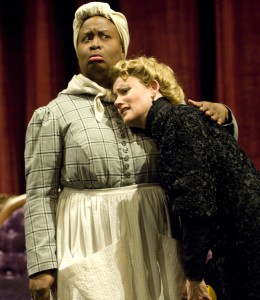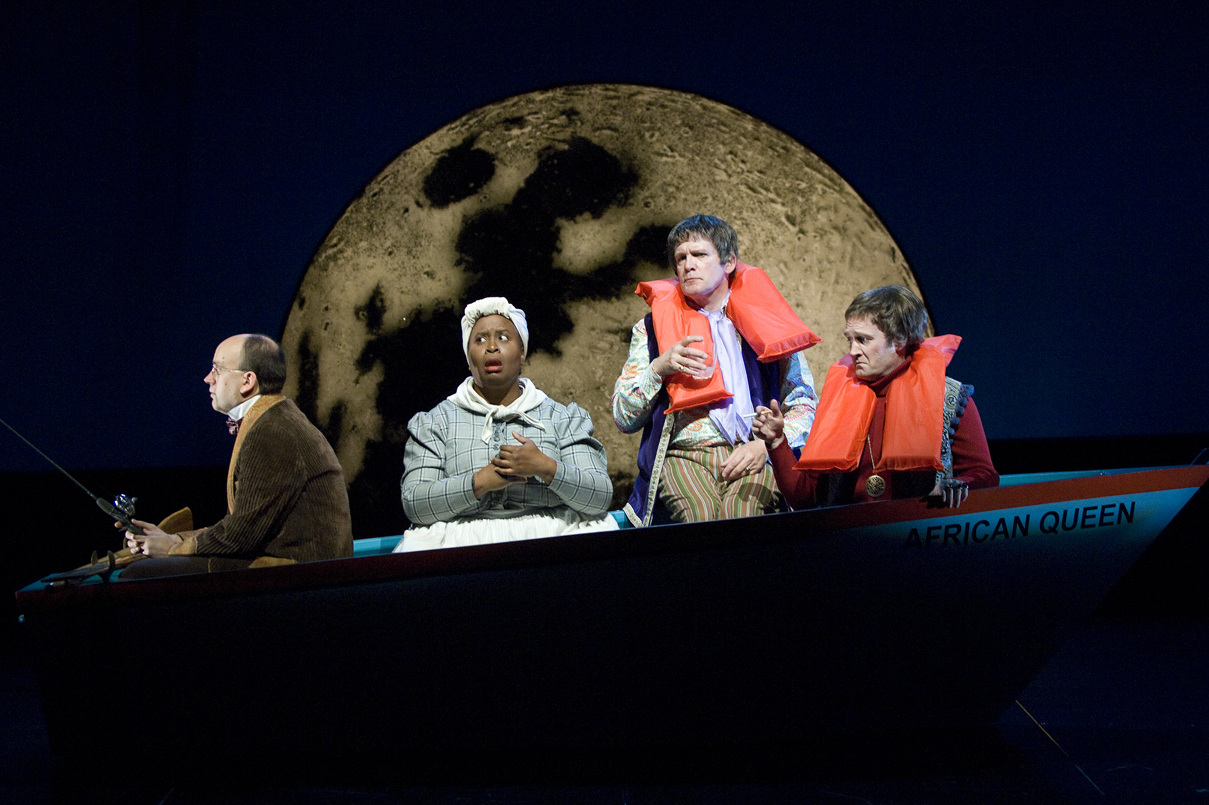The Further Adventures of Hedda Gabler, Jeff Whitty’s festive romp through a field of razor blades, brings to mind a couple of things. The first is the flap over the now infamous New Yorker magazine Obama cover illustration, the one that takes the various racial and incendiary whispers about the presidential candidate and his wife and gives them visual form. It’s clearly satirical, and clearly potent: It hits with merciless accuracy at precisely the points of fear and loathing that the dirtier fighters among Obama’s opponents are eager to exploit.
Yet, here’s the funny part: Obama’s camp itself, the presumed beneficiary of this political counterthrust, has found it necessary to protest vigorously against the images, even though the candidate undoubtedly understands their satirical point. Funnier yet: Obama’s opponent for the presidency, John McCain, has also found it necessary to protest, even though he surely understands the difference between satire and actuality. (Do the candidates truly believe that Swift wished to eat children?)

Now that they are presidential candidates, Obama and McCain find themselves the main characters in a pre-scripted drama. They are the guardians and servants of the nation’s images, and it becomes more important for them to respond to the illusion of reality than to reality itself. The script says, Americans don’t talk about such things. So the candidates, no matter “left” or “right,” must protest: To do less would be to place themselves outside the devoutly desired center of the let’s-pretend debate. And so they become the not-Obama and the not-McCain, fictional characters in a ritualized national drama that they can’t escape.
The second thing that Whitty’s comedy, playing in the Angus Bowmer Theater of the Oregon Shakespeare Festival in Ashland, brings to mind: Jasper Fforde‘s sly comic novels (
Sometimes minor characters — and even major ones — turn rogue and try to jump the plot, changing their stories, escaping into an entirely different book or even — horror of horrors — into the world of real people. (That explains some of our more unbelievable public figures.) So you find, for instance, Hamlet dithering around a modern cottage in England, getting a little R&R and casting a wayward if indecisive eye on a historical lady of situational virtue. The point is this: Even fictional characters, eternally predestined as they are fated to be, are looking for a little free will.
To escape, to run, to become one’s own! That, in Whitty’s comedy, is what Hedda Gabler, caught in a netherworld of memory and tragic repetition, seeks. Kept alive — or in existence, if you will — by the memories and affections of audiences around the world, she is condemned to forever shoot the pistol, forever slump into oblivion, forever reawake and repeat the process.
 So she runs, leaving behind her plodding husband, Tesman (who relies on her continued popularity for his own existence, and so urges her over and over to take up the gun); and Medea, a garrulous old gal who emerges from the wings every now and again with blood on her hands); and the Woman in Pink, an assertive residual memory from the mind of Ntozake Shange; and a few other drop-ins from the world of mythic and minor stereotype. To help her on the way, she enlists the support of the “happy” slave Mammy, not all that displeased to escape the enforced simperings and indignities of Gone With the Wind.
So she runs, leaving behind her plodding husband, Tesman (who relies on her continued popularity for his own existence, and so urges her over and over to take up the gun); and Medea, a garrulous old gal who emerges from the wings every now and again with blood on her hands); and the Woman in Pink, an assertive residual memory from the mind of Ntozake Shange; and a few other drop-ins from the world of mythic and minor stereotype. To help her on the way, she enlists the support of the “happy” slave Mammy, not all that displeased to escape the enforced simperings and indignities of Gone With the Wind.
In its affectionate explosion of semi-abandoned cultural stereotypes, The Further Adventures of Hedda Gabler is a bit like George C. Wolfe‘s biting send-up The Colored Museum. And as in Wolfe’s play, the affection is an essential ingredient: Whitty argues for the necessity of remembering and even honoring our cultural touchstones, even when they become a little musty and embarrassing. The mammies and the boys in the band and the suicidal housewives are the pioneers, the ones who did the best they could under the circumstances in which they found themselves, the ones who made possible a freer future.
Whitty also wrote the book for the Broadway puppet adventure Avenue Q, and so it’s no surprise that The Further Adventures is exquisitely theatrical, a staged event that repeatedly folds back on itself and the shards of Ibsen’s iconic tragedy, winking broadly at its own artificiality. (Its discussion of contemporary conceptual productions of the classics, given the festival’s current clattery version of A Midsummer Night’s Dream, is hilarious.)
What’s interesting about Whitty’s trapped characters is that what freedom they eventually find comes not by fleeing themselves but by delving deeper into the essence of who they are — by becoming, in effect, their own dramaturgs. Director Bill Rauch and his cast exploit this fully, from Robin Goodrin Nordli’s hammer-headed, self-absorbed Hedda, to the hilarious and ultimately touching pairing of Anthony Heald and Jonathan Haugen as a couple of flamboyant queens apparently left over from The Boys in the Band, to Kimberly Scott’s amazing turn as Mammy. She’s so persuasively appealing in the role of the happy slave woman who will soothe your troubled brow that she brings the festival’s mostly white audience to a nervous showdown with its own cultural assumptions.
There is a nice history to this production. Whitty grew up not far from the festival, in Coos Bay on the Oregon Coast. Rauch, the new artistic director in Ashland, directed Nordli in the title role of Hedda Gabler five years ago at the festival. And he directed the world premiere of Whitty’s Hedda at South Coast Repertory in Southern California. Ask Hedda: Some things just keep repeating themselves.
